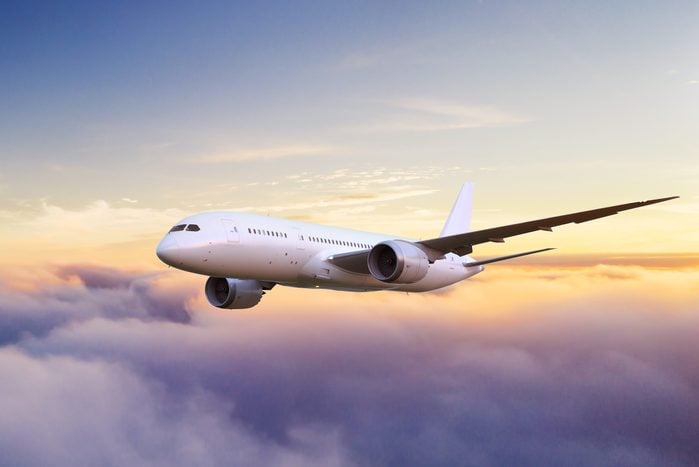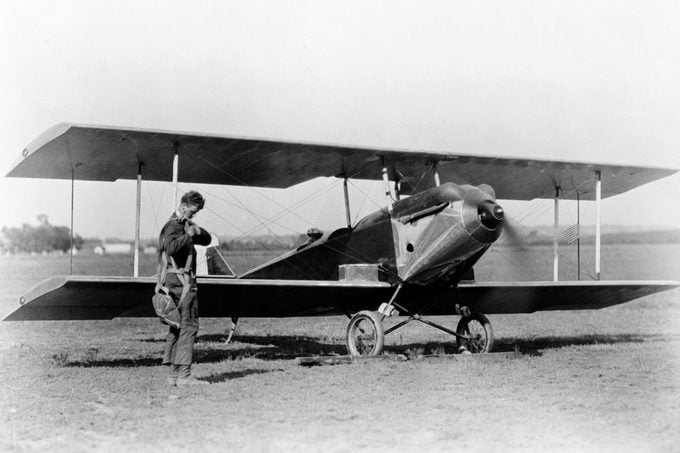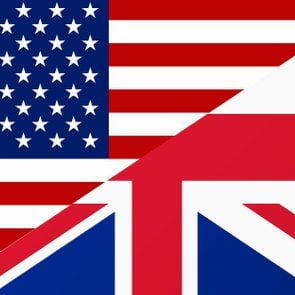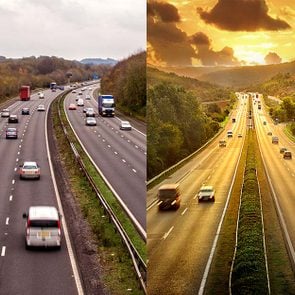Why Is “Airplane” Also Spelled “Aeroplane”?
Updated: May 16, 2022

The spelling difference is more than a matter of personal preference.
There are plenty of interesting airplane facts for air travelers to learn, like what certain airplane sounds mean, how high airplanes fly, how airplane Wi-Fi works, why it tends to be cold on flights, and what airplane mode on your phone actually does. Another interesting fact to think about that dips into the grammar-sphere: why “airplane” is also spelled as “aeroplane.”
You’re most likely familiar with the North American spelling of the word “airplane.” However, if you’ve ever been on an international flight heading to another English-speaking country like the United Kingdom, you’ve probably noticed it spelled as “aeroplane.” So, why is it spelled differently between American English and British English?
Which is correct: Airplane or aeroplane?
Technically, both “airplane” and “aeroplane” are correct, since they’re the same word spelled differently. Why is that, exactly? It has to do with many words in the English language coming from other languages, like Latin, Greek, and French. “British English has a general tendency to favo(u)r spellings and words that are reminiscent of French, whereas American English, when it has deviated from what British English does, often changes in the direction of seeming less French,” explains Lynne Murphy, author of The Prodigal Tongue: The Love-Hate Relationship Between American and British English.
Even though both “airplane” and “aeroplane” have the same meaning, should they be classified as different words altogether? “It’s not just spellings, they’re also pronounced differently, so I’d probably say they’re two different words,” says Murphy. Here are a few words that mean very different things in America and England.
The history of “airplane” and “aeroplane”
Words, a lot of the time, come from other words. Sometimes, the words we use now are shortened versions of the original word, including shortening “airplane” to simply “plane.” But what was the original meaning of the words “airplane” and “aeroplane”? “In the French from which it was borrowed, the ‘plane’ is related to a geometrical plane (flat surface), which then became the name of the flat parts of flying machines that allow them to achieve lift,” says Murphy. “The 19th-century French word ‘aéroplane’ is made up of ‘aéro,’ meaning ‘air,’ and the Greek word ‘planos,’ meaning ‘wandering.'” By the way—did you know these airplane features existed?
When was “airplane” first used?

According to Merriam-Webster, the first known use of the word “airplane” was in 1906, about three years after the Wright brothers took to the air on the first successful flight with the “flying machine.” More than 20 years after the Wright brothers took flight, Charles Lindbergh became the first person to fly solo across the Atlantic nonstop, helping to cement airplane travel across the Atlantic and around the world. Air travel has evolved and changed significantly in the decades since that time period, featuring additions like airplane Wi-Fi, airplane toilets, entertainment, and in-flight food.
Shifting from “aeroplane” to “airplane”
There’s a lot of history that goes beyond words and dives deep into politics, government, and science. “Aeroplane” is no exception. “We’re comfortable with ‘aero’ in scientific jargon, but as planes became more common things to talk about, the ‘aero’ seemed too fancy,” explains Murphy. “In Scientific American in 1906, there was already a claim that ‘Air-plane is a much better word than aeroplane. It is as good etymologically, and much better when it is spoken.’ Ten years later, ‘airplane’ was adopted by the National Advisory Committee for Aeronautics as their term. It was considered by the BBC in the United Kingdom, but that proposal didn’t go anywhere.” Here are the British words and sayings everyone should know.
Airplane and aeroplane: Byproducts of English words and “fancy” spellings
The differences between the words “airplane” and “aeroplane” go beyond the invention of the airplane. When the United States wanted independence from Great Britain, that also included dictionaries full of separate and distinct spelling of words. Spelling variations were more variant during that time than today. “Choosing the less ‘fancy’ spelling was something that Noah Webster, America’s first important lexicographer, did as a patriotic act: trying to make an English spelling system that was truer to English pronunciation, and trying to promote a standard that would bring the disparate colonies together,” says Murphy. “It took a long time for those spelling differences to really take hold.”
However, there’s a good reason why words that mean the same thing are spelled differently, and why that will continue to happen. “Your spelling tells people where you’re from, and people are generally proud of where they’re from, so they continue to spell differently,” says Murphy.
Next, find out why airplane seats are actually facing the wrong way.
Sources:
- Lynne Murphy, author of The Prodigal Tongue: The Love-Hate Relationship Between American and British English
- Oxford Learner’s Dictionaries: “Aeroplane”
- Merriam-Webster: “Learn More About Airplane”
- History.com: “First Airplane Flies”
- NASA: “‘Airplanes’ or ‘Langleys’ and Other Tales of the NACA”



